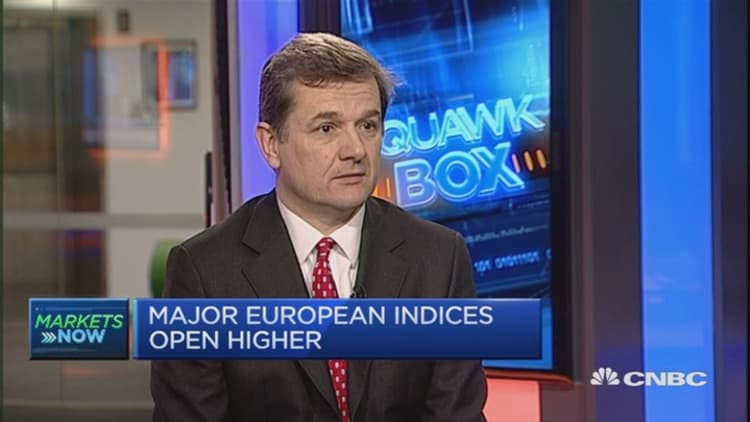The prolonged sell-off in risk assets across the globe will only abate if the U.S. Federal Reserve changes its path and begins to loosen its monetary policy once again, according to strategists at Deutsche Bank.
Chinese growth fears, stress in the U.S. energy sector and fragile balance sheets in European financial companies have all been credited in the last week for fueling the sell-off. However, there's only one real cure for this current bout of weakness, according to a team of European equity analysts at the German bank, led by Sebastian Raedler.
"Without policy intervention, there is more downside risk for equities," the bank said in a note entailed "The smell of default" on Monday.
A major focus for the analysts has been rising bond yields on riskier corporate debt in the U.S.. This has been seen as a sign of an end of the current credit cycle, which in turn could that could pave way for a number of defaults in the country, the bank noted. Raedler said that U.S. high-yield spreads – the difference between investment grade and non-investment grade bonds - have risen above their 2011 peak and warned of the potential for a self-fulfilling "full default cycle." He highlighted the stress had started with energy firms - that have been hit by the oil price plunge – but added that it wasn't confined to this sector
"To avoid a further rise in U.S. defaults, we will likely need to see a Fed relent, leading to a sustainable drop in the dollar, higher oil prices and reduced energy balance sheet stress," the bank said in the report.
The problem for investors is that there is little sign of the Fed wanting to change course, Raedler added. Data last week from the Bureau of Labor Statistics showed that U.S. firms were continuing to hire with 5.6 million job openings in December 2015, up from 5.43 million job openings in November.
Rather than cutting, these data are likely to leave the U.S. central bank on course for more rate hikes after it decided to tighten policy at its December meeting last year. However, Fed Chair Janet Yellen sounded a more cautious tone in her testimony to Congress on Thursday.
Equities have been roiled this year with the pan-European Euro Stoxx 600 index down 12 percent and the already losing nearly 9 percent, both on course for their worst year since the 2008 financial crisis. Deutsche Bank shares have been at the forefront of the selling in Europe with questions raised over the quality of its balance sheet.
A "full default cycle" in the U.S. would trigger a further 20 percent downside European equities, Raedler said, but would also increase the risk of a U.S. recession. He believes that this rising cost of debt for corporates would reduce their spend on investment and hiring. Falling equity prices would also urge people to save and thereby dent consumption growth, he added.

Recession talk has been a hot topic this year alongside the possibility of central banks using negative deposit rates to stimulate their economies. However David Absolon, Investment Director at Heartwood Investment Management believes that the U.S. economy is not in the "doldrums" yet.
"The Fed is walking a tightrope between being seen to show confidence in the U.S. economy and at the same time acting to navigate against difficult global headwinds," he said in a note Monday.
"The U.S. economy, while anemic, continues to expand," he added.





